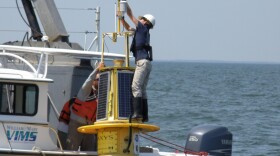Dominion Virginia Power says it wants to develop offshore wind power, but the high cost of installation would make it far more expensive than electricity produced by burning fossil fuels or operating a nuclear plant. The utility also wonders how well offshore turbines would fair during a hurricane. Now, engineers at the University of Virginia have come up with a design that could solve both of those problems.
Professor Eric Loth might have something in common with Sir Isaac Newton – the 17th century scientist who grasped the concept of gravity when the tree above him dropped an apple. Loth’s wind turbine design was inspired by a palm.
“Turbine blades morph once the wind speeds get really high, so they can adapt to the stresses in the wind. The analogy we like to use is the palm tree, because the palm tree deflects with the wind. The trunk can touch the ground, and the next day it’s standing back up no worse for the wear, whereas an oak tree will be completely uprooted.”
And the turbine will be massive, with blades the length of two football fields, able to produce ten times more power than existing models.
“This is not an incremental project to try and make things a little bit better. We are trying to completely transform the way offshore energy works.”
Loth says it could take a decade to build and test the new super turbine, but with a $3.8 million grant from the federal government, he’s confident it can be done.
‘The Chinese though are moving really fast, so the Department of Energy has asked whether or not we can consider moving forward more quickly. They’re interested in us getting this technology as soon as possible. It’s a worldwide competition. The Europeans are number one. The United States is catching up, but the Chinese are really aggressive in this market.”
The super turbine will be assembled in sections, making transportation and installation relatively easy. Working with two national laboratories and universities in Illinois and Colorado, UVA hopes to test its design in a mountain pass where winds routinely exceed 100 miles an hour.





